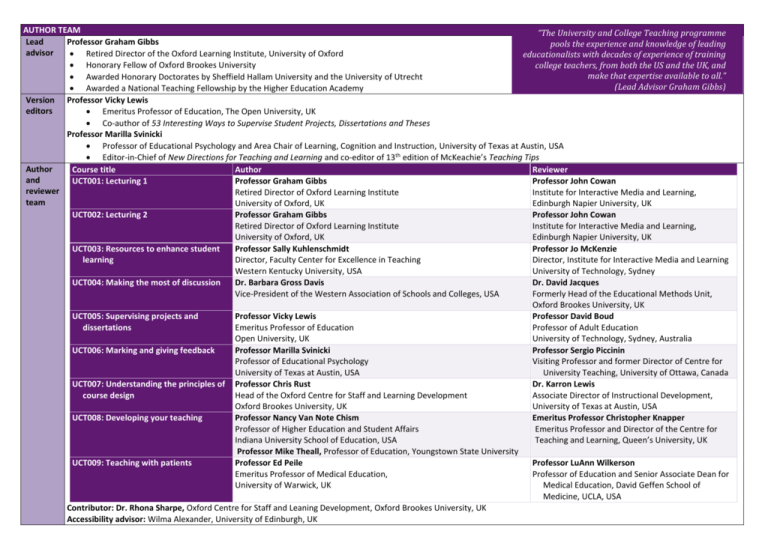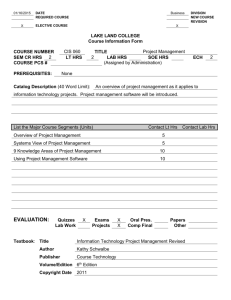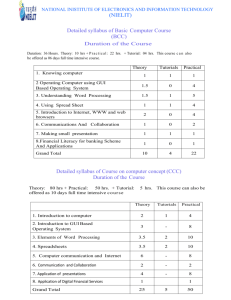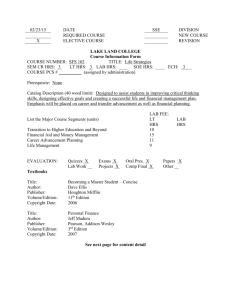AUTHOR TEAM
advertisement

AUTHOR TEAM “The University and College Teaching programme Lead Professor Graham Gibbs pools the experience and knowledge of leading advisor Retired Director of the Oxford Learning Institute, University of Oxford educationalists with decades of experience of training Honorary Fellow of Oxford Brookes University college teachers, from both the US and the UK, and make that expertise available to all.” Awarded Honorary Doctorates by Sheffield Hallam University and the University of Utrecht (Lead Advisor Graham Gibbs) Awarded a National Teaching Fellowship by the Higher Education Academy Version Professor Vicky Lewis editors Emeritus Professor of Education, The Open University, UK Co-author of 53 Interesting Ways to Supervise Student Projects, Dissertations and Theses Professor Marilla Svinicki Professor of Educational Psychology and Area Chair of Learning, Cognition and Instruction, University of Texas at Austin, USA Editor-in-Chief of New Directions for Teaching and Learning and co-editor of 13th edition of McKeachie’s Teaching Tips Author Course title Author Reviewer and UCT001: Lecturing 1 Professor Graham Gibbs Professor John Cowan reviewer Retired Director of Oxford Learning Institute Institute for Interactive Media and Learning, team University of Oxford, UK Edinburgh Napier University, UK UCT002: Lecturing 2 Professor Graham Gibbs Professor John Cowan Retired Director of Oxford Learning Institute Institute for Interactive Media and Learning, University of Oxford, UK Edinburgh Napier University, UK UCT003: Resources to enhance student Professor Sally Kuhlenschmidt Professor Jo McKenzie learning Director, Faculty Center for Excellence in Teaching Director, Institute for Interactive Media and Learning Western Kentucky University, USA University of Technology, Sydney UCT004: Making the most of discussion Dr. Barbara Gross Davis Dr. David Jacques Vice-President of the Western Association of Schools and Colleges, USA Formerly Head of the Educational Methods Unit, Oxford Brookes University, UK UCT005: Supervising projects and Professor Vicky Lewis Professor David Boud dissertations Emeritus Professor of Education Professor of Adult Education Open University, UK University of Technology, Sydney, Australia UCT006: Marking and giving feedback Professor Marilla Svinicki Professor Sergio Piccinin Professor of Educational Psychology Visiting Professor and former Director of Centre for University of Texas at Austin, USA University Teaching, University of Ottawa, Canada UCT007: Understanding the principles of Professor Chris Rust Dr. Karron Lewis course design Head of the Oxford Centre for Staff and Learning Development Associate Director of Instructional Development, Oxford Brookes University, UK University of Texas at Austin, USA UCT008: Developing your teaching Professor Nancy Van Note Chism Emeritus Professor Christopher Knapper Professor of Higher Education and Student Affairs Emeritus Professor and Director of the Centre for Indiana University School of Education, USA Teaching and Learning, Queen’s University, UK Professor Mike Theall, Professor of Education, Youngstown State University UCT009: Teaching with patients Professor Ed Peile Professor LuAnn Wilkerson Emeritus Professor of Medical Education, Professor of Education and Senior Associate Dean for University of Warwick, UK Medical Education, David Geffen School of Medicine, UCLA, USA Contributor: Dr. Rhona Sharpe, Oxford Centre for Staff and Leaning Development, Oxford Brookes University, UK Accessibility advisor: Wilma Alexander, University of Edinburgh, UK KEY PRODUCT INFORMATION Approximate Title duration Programme overview Learning outcomes Versions Online duration* Optional activity CTL/CP2P duration** duration Title Online duration* CTL/CP2P duration 3.25 hrs Optional activity duration** 21.5 hrs UCT001: Lecturing 1 2 hrs 12 hrs 9 hrs UCT002: Lecturing 2 3 hrs 17 hrs 9 hrs ULM006: Marking and giving feedback ULM007: Understanding the principles of course design ULM008: Developing your teaching UCT009: Teaching with patients 1.75 hrs 12.5 18 hrs UCT 003: Resources to enhance 4 hrs 9.5 hrs 4.5 hrs 16.5 hrs 17 hrs student learning UCT004: Making the most of 4 hrs 17 hrs 13 hrs 2.5 hrs 14.5 hrs discussion UCT005: Supervising projects and 2.5 hrs 17.5hrs 9 hrs dissertations What are the strengths and weaknesses of the lecture format and how can you make it more interactive, even if you have a huge class? How do you go about gathering and developing resources for your new course? Are you consistent and efficient in your marking/grading? Do your assessment criteria even test the things you want them to? How can you deliver feedback to students in the most effective way? And how can you get – and act upon – feedback on your own teaching? What should you do if one of your PhD students comes over all emotional? 10 hrs 16 hrs 17.5 hrs This programme is designed to help those new to teaching in an academic environment answer these and many other questions that will arise as they approach the task for the first time. It gives them the key skills they need to plan and deliver engaging and innovative courses for their students. By the end of the course, you should be able to: Implement new strategies for planning and delivering your teaching through lectures, discussions and supervisions Understand how to reflect critically on and improve your own teaching practices Each of the courses is available in two subject versions: US UK/international DETAILED COURSE INFORMATION Content UCT001: Lecturing 1 Introduction to lecturing (definitions, rationales) Evidence about lecturing (effectiveness, student attention, information overload) Structuring lecture content (different options, signposting transitions, summarising/closing) Lecturing using questions and technology UCT002: Lecturing 2 UCT 003: Resources to enhance student learning Presentation skills (What not to do; useful tips) Planning your learning resources (your context, making choices, physical, emotional and intellectual Increasing student engagement (gaining/holding access) attention, using discussion and activities) Supporting student note-taking (why? how? using Locating and selecting learning resources (textbooks, digital resources, web-based resources) technology) Designing effective learning resources (reading lists, Supporting students with special needs study guides, workbooks, multimedia, interactive) Handling problems during lecture (tackling Using and improving learning resources (guiding incidents, avoiding problems, large classes) student use, troubleshooting, improving) Evaluating and improving lectures (observing, getting feedback from colleagues and students, using video) UCT004: Making the most of discussion Preparing yourself/your students for discussion (planning, clarifying expectations, assessment) Creating a comfortable environment (introductions, communication, respect) Starting a discussion (question strategies, structured discussion techniques) Guiding a discussion (fielding questions, stepping in when needed, closing a discussion) Managing online discussions (using technology, creating a social presence online, moderating) Evaluating and improving (gathering feedback from students and colleagues, using video) ULM007: Understanding the principles of course design Contextualising the course (course/institutional/student/personal context) Designing a course that promotes learning (key principles, high-impact activities) Ensuring your course is aligned (Bloom’s taxonomy, writing learning outcomes) Building your course (structure, feedback, blended learning) Evaluating your course (value, sources of feedback) UCT005: Supervising projects and dissertations ULM006: Marking and giving feedback Preparing for supervision (purpose, record Introduction (your context, relation to learning keeping, collaborative tools, part-time students) outcomes, marking criteria/rubrics, consistency, volume of work, using technology) Getting students started (building a good relationship, setting guidelines/expectations, Dealing with plagiarism (what to do, how to deter) identifying suitable topics/questions, giving Giving students feedback (qualities of good feedback) feedback, phrasing, peer-to-peer and technology Keeping students going (reviewing progress, enhanced feedback, encouraging a positive response) handling students’ emotions, the writing process, presentations skills, troubleshooting) The final stages (the final push, assessment, vivas) ULM008: Developing your teaching UCT009: Teaching with patients Developing your teaching identity (how and why, teaching styles/approaches) Getting and using feedback (formative, summative, from students, from colleagues) Strategies for development (teaching and learning centres, portfolios, research, networking) Continuous teaching development (becoming a teacher–scholar, maintaining vitality, expanding your teaching roles, goal-setting) Before teaching with patients (preparation, settings, active learning, developing clinical reasoning) Whilst teaching with patients (sequencing, encouraging student independence, peer-facilitation, interprofessional teaching, assessment) After teaching with patients (debriefing/feedback, quality improvement) Developing further your teaching with patients (avoiding problems, special patient situations)







